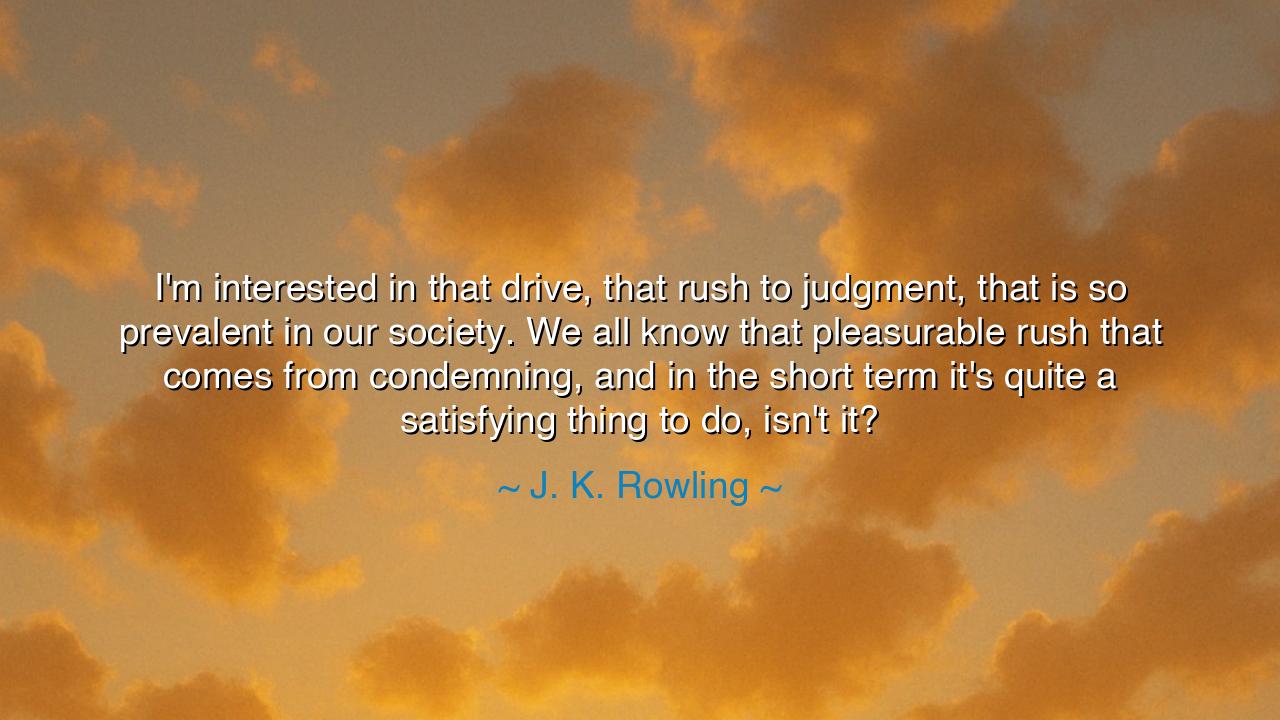
I'm interested in that drive, that rush to judgment, that is so
I'm interested in that drive, that rush to judgment, that is so prevalent in our society. We all know that pleasurable rush that comes from condemning, and in the short term it's quite a satisfying thing to do, isn't it?






The words of J. K. Rowling, “I'm interested in that drive, that rush to judgment, that is so prevalent in our society. We all know that pleasurable rush that comes from condemning, and in the short term it's quite a satisfying thing to do, isn't it?” strike like an arrow into the heart of human weakness. Here she names a truth that has been with us since the dawn of tribes and kingdoms: the temptation of quick condemnation, the sweet but fleeting taste of judgment. It is an intoxicating power, for when we condemn, we raise ourselves above another. Yet, as all the sages have warned, the fruit of condemnation is bitter in the end, and the society that feeds upon it grows frail and divided.
The origin of this saying lies in Rowling’s reflection on the culture of public opinion, where voices rise swiftly to shame, accuse, and cast down. It is a culture not limited to one age but present in every era. Ancient Athens knew it in the trial of Socrates, condemned to drink poison because the citizens found it easier to silence the gadfly than to endure his questioning. Medieval Europe knew it in the burning of so-called heretics, where the crowd rejoiced at the fire, believing themselves righteous in their judgment. And today, we know it in the storms of public shaming, where whole lives can be undone in a single hour of condemnation.
Consider the tale of the Salem witch trials. In the seventeenth century, fear and suspicion swept through a small community. The rush to judgment consumed reason, and neighbors condemned neighbors with trembling voices. In those moments, the accusers felt that “pleasurable rush” Rowling names—the satisfaction of placing blame, of striking down the supposed guilty. Yet history remembers Salem not as a triumph of justice, but as a tragedy of hysteria. Innocent lives were lost because the community found more comfort in condemning than in seeking truth. So too in every age: judgment is quick, but wisdom is slow.
Why, then, is condemning so tempting? Because it offers the illusion of control. To condemn is to place oneself above another, to claim the mantle of moral superiority without examining one’s own faults. It is easier to point outward than to look inward. And in that ease lies the danger. For the more a people practice condemnation, the less they practice compassion. A society that feeds upon judgment loses its heart, and a heartless society soon loses its strength.
Yet Rowling’s words also contain the seed of hope. By naming this temptation, she invites us to resist it. To know that the “rush” of judgment is pleasurable but fleeting is to gain power over it. Like the ancients who trained themselves to master desire, so too must we master the desire to condemn. This does not mean abandoning justice; justice demands accountability. But justice is slow, measured, and fair, while condemnation is rash, vengeful, and often blind.
The lesson is plain: resist the rush to judgment. When anger stirs, pause. When gossip whispers, wait. When the crowd cries out for blood, remember that history rarely honors the crowd, but honors those who stood apart with wisdom and mercy. Practice empathy. Ask not first, “How do I condemn?” but “How do I understand?” For in understanding, the fire of condemnation cools, and the possibility of redemption appears.
Practical actions follow naturally: speak less swiftly, listen more deeply. Read not only the accusations, but also the context. When tempted to join in public outrage, remember the faces of those falsely accused throughout history, and ask whether your judgment is truly just. And in your daily life, cultivate mercy; for the measure you give to others will one day be measured to you.
Thus let Rowling’s words be a guide to generations: the pleasure of condemning is fleeting, but the practice of compassion endures. Choose not the shallow rush of judgment, but the deeper strength of patience and understanding. For those who master this wisdom will build not only stronger societies, but nobler souls.






AAdministratorAdministrator
Welcome, honored guests. Please leave a comment, we will respond soon